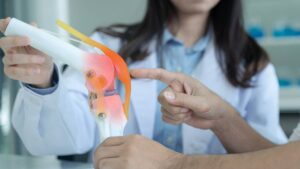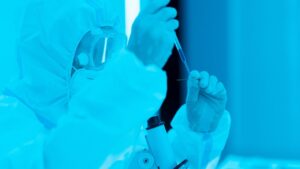Dr Boreham’s Crucible: Genetic Signatures lures the deep-pocketed backers in the battle of the bugs

Pic: Oscar Wong / Moment via Getty Images
As the saying goes, if you can make it in New York you can make it anywhere. But for the home-grown molecular diagnostics house, cracking it in Australia has been the acid test of its greater abilities.
“The Australian diagnostic market is the hardest in the world,” says Genetic Signatures (ASX:GSS) chief Dr John Melki. “It is highly competitive. Rebates are the lowest in the world and pricing is similar to that in Vietnam.”
What’s more, the big three local pathology providers account for 60 to 70 per cent of the market – a concentration you do not see elsewhere.
A provider of all-in-one testing for range of bugs, Genetic Signatures is further frustrated by the Medicare reimbursement coding system.
That’s because the current rules only allow funding for three tests, but the company might test for 20 diseases in one go.
Despite these trips and traps, Genetic Signatures has gleaned a 10 to 25 per cent share of the local market, which in the 2018-19 year accounted for 97 per cent of its revenue.
“We are incredibly proud of what we have done in Australia,” Dr Melki says. “But we are only 1 or 2 per cent of the world market while the US and Europe account for 75 per cent.”
To achieve its offshore ambitions, the company has just raised a meaty $35m in a share placement that saw Perennial Value Management come on as a cornerstone holder.
The raising was also supported by existing holder Regal Funds Management and an unnamed offshore institution.
Genetic Signatures retail holders have now been invited to fill their boots for up to 30,000 shares ($29,400 worth) at the 98c a share offer price (the same as the placement price).
The story to date
Genetic Signatures was founded in 2001 by prominent fund manager Christopher Abbott and the late Dr Geoffrey Grigg, former head of microbiology at the esteemed Commonwealth Scientific and Industrial Research Organisation.
Dr Melki joined the company in 2003, having researched DNA and microarray technologies. He was awarded the Sydney University Peter Bancroft Prize in 2001.
Genetic Signatures listed on the ASX in March 2015, raising $7.5m at 40c apiece.
The co-founder of boutique investment house Maple Brown Abbott, Christopher Abbott, has a 31.7 per cent stake.
He is also not on the board and lets management get on with the job, much to the envy of certain other biotechs with pesky major shareholders.
Bug off!
In short, Genetic Signatures tests for rapid screening of pathogens so that the appropriate antibiotic or treatment can be swiftly dispensed.
The tests replace old lab methods such as the ‘stool on a slide’ under a microscope and can be done in hours rather than days.
Dr Melki says the 3-base test can be used with urine samples or swabs for sexually transmitted infections (STIs), throat swab for respiratory disease or stools for gut problems and the test reads out the presence of target pathogens.
This is especially appealing to hospitals as they grapple to control antibiotic-resistant bugs.
The company’s Easyscreen tests are based on the company’s 3-base technology, which allows for faster and more accurate diagnosis of a number of ailments.
The existing tests cover flu and gastro enteric strains, flavivirus and alphavirus, antibiotic resistant bugs and STIs.
The most advanced product, Easyscreen Enteric, tests for 20 tummy bugs including norovirus, the bane of many a cruise ship.
How the tests work
Glad you asked.
The tests take the genetic information of the targeted organism and change the genetic sequence to make it easier to detect.
As the name implies, 3-base converts the original four-base microbial genome to three, which reduces the variables from more than 1 million to a mere 60,000 or so.
All readers really need to know is that it reduces pathology turnaround times from five days to less than five hours.
“We can do what no-one else can,” Dr Melki says. “For example, we can look for 20 causes of gastro and do 200 tests at a time.”
Seal of approval
The company’s kits are approved in Australia and Europe and are sold in 30 countries, with more than 500,000 patients treated to date.
The current tests are for a range of gastroenteric and respiratory bugs (notably the flu) and antibiotic resistant superbugs.
The company expects to lodge applications for STIs and other genital pathogens and flavovirus and alphavirus in Australia and Europe, with a view to selling in 2020.
A submission to the US Food and Drug Administration for enteric protozoan testing is also imminent, also with a view to launching the tests there in 2020.
Found in the gut of humans and other mammals, enteric protozoa are diarrhoea-inducing parasitic infections including giardia and cryptosporidium.
Like enteric bacteria and viruses, they can be found in water following direct or indirect contamination by faeces. Sydneysiders may recall the water contamination crisis in 1998 when they were forced to boil their drinking water.
“Essentially they can be hard to detect with traditional methods and can cause chronic illness,” Dr Melki says.
Genetic Signatures is targeting a 10 to 15 per cent share of the 5.5 million enteric protozoan tests done in the US annually.
In the US, the company is already allowed to sell analytical spectrum re-agents, in effect ingredients to be incorporated in tests that are self-developed by the labs.
In Europe, the company has assembled a small sales force for a concerted push into that market, targeting path labs with mid to high throughput.
Dr Melki says Europe is moving to a higher standard of testing, which raises the bar in terms of registration requirements.
Given Genetic Signatures products are grandfathered from the new requirements, this should work in the company’s favour.
Finances and performance
Dr Melki says he is “absolutely delighted” by the $35m raised, with the prospect of another $2m to come.
Of this amount, $10m will be used to expand the company’s sales force from 13 staff to 36, with $6m earmarked for clinical trials.
A further $5m will be spent on new customer installations.
Genetic Signatures reported record third (September) quarter revenue of $1.53m, 54 per cent better than a year previously. The company also made a $1.27m loss.
In the year to June 2019, Genetic Signatures generated revenue of $4.9m, 75 per cent higher and with a $3.5m deficit.
Genetic Signatures revenues derive from a mix of capital equipment and consumables, a.k.a the ‘printer and cartridge’ model.
Customers can use their own diagnostics or buy their own hardware and in some cases it’s worthwhile for Genetic Signatures to fund this capital equipment.
Dr Boreham’s (non-molecular) diagnosis:
Genetic Signatures revenue has grown steadily from a standing start in 2014. But as this business is almost entirely derived locally, the European push should boost turnover, meaningfully.
The company doesn’t exactly have the field to itself, in that it competes with other molecular diagnostics outfits as well as the traditional lab assays.
Dr Melki says the nearest rival is the South Korean molecular diagnostics testing house Seegene, which is active in Europe but not the US. Listed on the South Korean exchange, Seegene is valued at around $700m.
Genetic Signatures revenues are influenced by the severity or otherwise of the influenza season, which was a good one this year as it started early.
(Not good for the sufferers of course).
The beauty of a Northern Hemisphere business is that the flu seasons don’t align with Australia’s which smooths out revenues over the year.
With a cabal of deep-pocketed backers and a strong record of customer retention, there’s no reason why Genetic Signatures shouldn’t prevail in the battle of the bugs on the global stage.
Let’s not forget the Australian market accounts for a little more than 1 per cent of the world’s $US7.6 billion ($11.1 billion) molecular diagnostics market.
Disclosure: Dr Boreham is not a qualified medical practitioner and does not possess a doctorate of any sort. He would also be “absolutely delighted” to diagnose $35m if anyone is offering.
This column first appeared in Biotech Daily.
More from Tim Boreham:
PainChek on a painless path to success; shares up over 1000 per cent
Elixinol says FDA hemp call an ‘inflexion point’ for industry
The story of Clinuvel, an Australian triumph
The content of this article was not selected, modified or otherwise controlled by Stockhead. Stockhead has not provided, endorsed or otherwise assumed responsibility for any financial product advice contained in this article.
UNLOCK INSIGHTS
Discover the untold stories of emerging ASX stocks.
Daily news and expert analysis, it's free to subscribe.
By proceeding, you confirm you understand that we handle personal information in accordance with our Privacy Policy.








